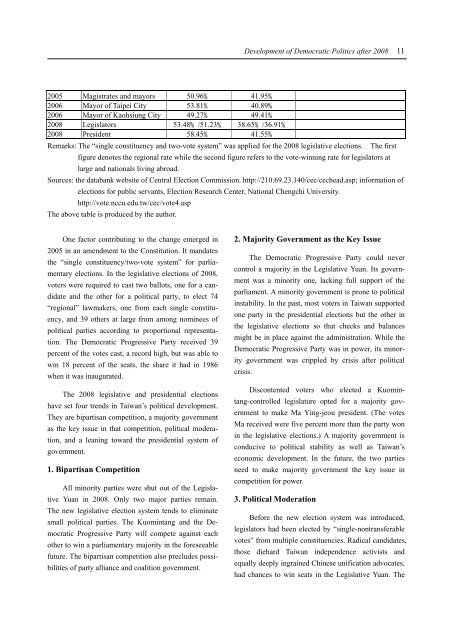PDF(2.7mb) - 國家政策研究基金會
PDF(2.7mb) - 國家政策研究基金會
PDF(2.7mb) - 國家政策研究基金會
Create successful ePaper yourself
Turn your PDF publications into a flip-book with our unique Google optimized e-Paper software.
Development of Democratic Politics after 2008 11<br />
2005 Magistrates and mayors 50.96% 41.95%<br />
2006 Mayor of Taipei City 53.81% 40.89%<br />
2006 Mayor of Kaohsiung City 49.27% 49.41%<br />
2008 Legislators 53.48%/51.23% 38.65%/36.91%<br />
2008 President 58.45% 41.55%<br />
Remarks: The “single constituency and two-vote system” was applied for the 2008 legislative elections. The first<br />
figure denotes the regional rate while the second figure refers to the vote-winning rate for legislators at<br />
large and nationals living abroad.<br />
Sources: the databank website of Central Election Commission. http://210.69.23.140/cec/cechead.asp; information of<br />
elections for public servants, Election Research Center, National Chengchi University.<br />
http://vote.nccu.edu.tw/cec/vote4.asp<br />
The above table is produced by the author.<br />
One factor contributing to the change emerged in<br />
2005 in an amendment to the Constitution. It mandates<br />
the “single constituency/two-vote system” for parliamentary<br />
elections. In the legislative elections of 2008,<br />
voters were required to cast two ballots, one for a candidate<br />
and the other for a political party, to elect 74<br />
“regional” lawmakers, one from each single constituency,<br />
and 39 others at large from among nominees of<br />
political parties according to proportional representation.<br />
The Democratic Progressive Party received 39<br />
percent of the votes cast, a record high, but was able to<br />
win 18 percent of the seats, the share it had in 1986<br />
when it was inaugurated.<br />
The 2008 legislative and presidential elections<br />
have set four trends in Taiwan’s political development.<br />
They are bipartisan competition, a majority government<br />
as the key issue in that competition, political moderation,<br />
and a leaning toward the presidential system of<br />
government.<br />
1. Bipartisan Competition<br />
All minority parties were shut out of the Legislative<br />
Yuan in 2008. Only two major parties remain.<br />
The new legislative election system tends to eliminate<br />
small political parties. The Kuomintang and the Democratic<br />
Progressive Party will compete against each<br />
other to win a parliamentary majority in the foreseeable<br />
future. The bipartisan competition also precludes possibilities<br />
of party alliance and coalition government.<br />
2. Majority Government as the Key Issue<br />
The Democratic Progressive Party could never<br />
control a majority in the Legislative Yuan. Its government<br />
was a minority one, lacking full support of the<br />
parliament. A minority government is prone to political<br />
instability. In the past, most voters in Taiwan supported<br />
one party in the presidential elections but the other in<br />
the legislative elections so that checks and balances<br />
might be in place against the administration. While the<br />
Democratic Progressive Party was in power, its minority<br />
government was crippled by crisis after political<br />
crisis.<br />
Discontented voters who elected a Kuomintang-controlled<br />
legislature opted for a majority government<br />
to make Ma Ying-jeou president. (The votes<br />
Ma received were five percent more than the party won<br />
in the legislative elections.) A majority government is<br />
conducive to political stability as well as Taiwan’s<br />
economic development. In the future, the two parties<br />
need to make majority government the key issue in<br />
competition for power.<br />
3. Political Moderation<br />
Before the new election system was introduced,<br />
legislators had been elected by “single-nontransferable<br />
votes” from multiple constituencies. Radical candidates,<br />
those diehard Taiwan independence activists and<br />
equally deeply ingrained Chinese unification advocates,<br />
had chances to win seats in the Legislative Yuan. The

















